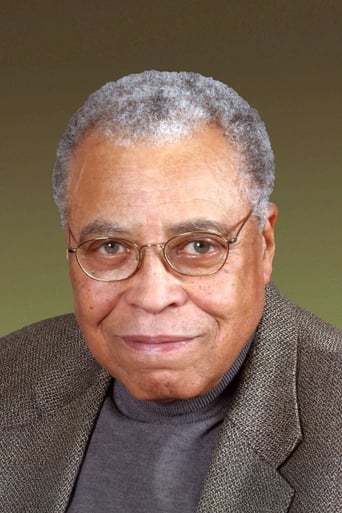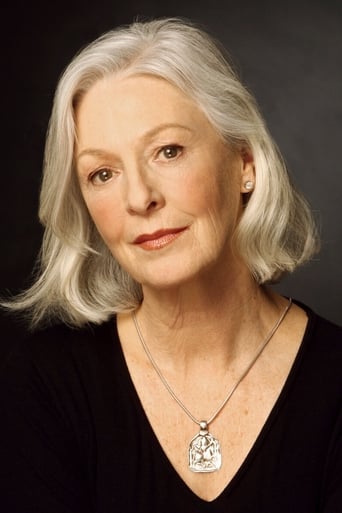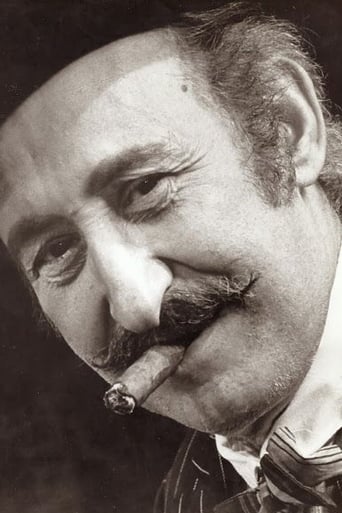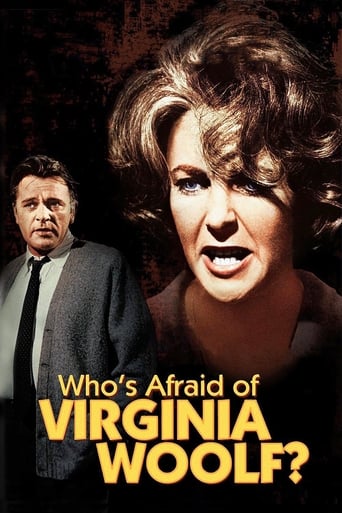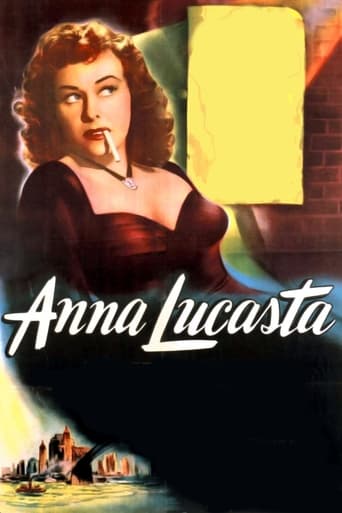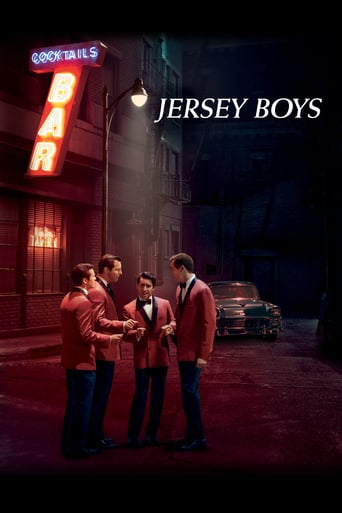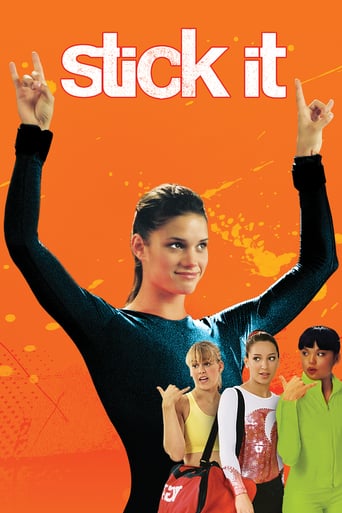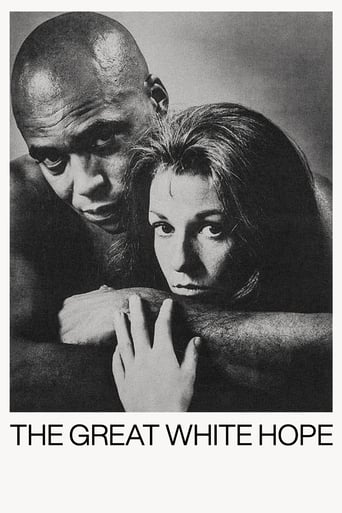
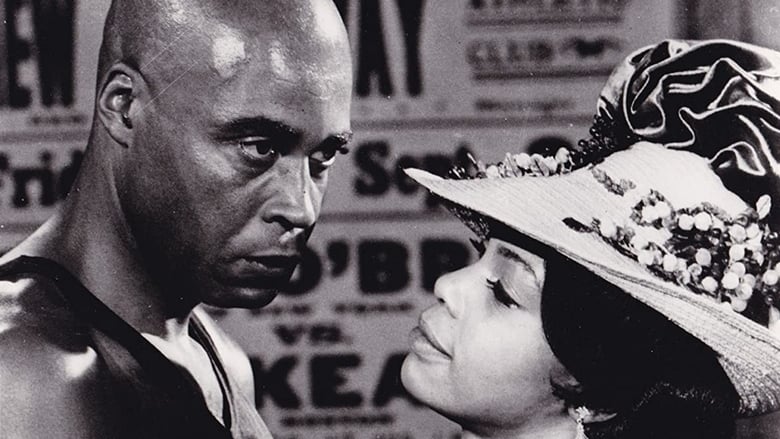
The Great White Hope (1970)
A black champion boxer and his white female companion struggle to survive while the white boxing establishment looks for ways to knock him down.
Watch Trailer
Cast
Similar titles
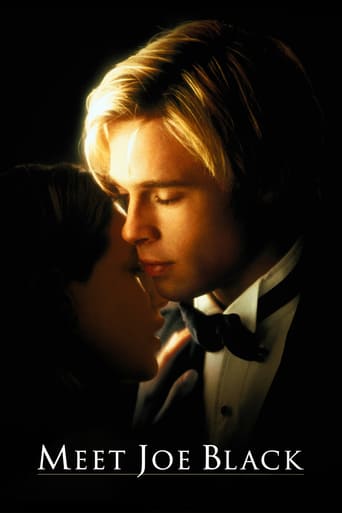
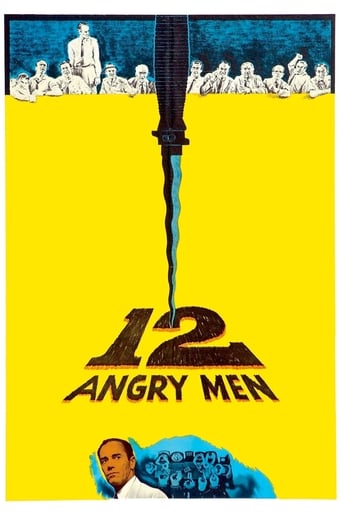
Reviews
How sad is this?
Disappointment for a huge fan!
It's funny, it's tense, it features two great performances from two actors and the director expertly creates a web of odd tension where you actually don't know what is happening for the majority of the run time.
Very good movie overall, highly recommended. Most of the negative reviews don't have any merit and are all pollitically based. Give this movie a chance at least, and it might give you a different perspective.
Despite the bad news that I'll relate shortly, this is one heckuva film with bravura performances by James Earl Jones and Jane Alexander.But first, the bad news. The emphasis here is not on boxing, and as a result there is darned little boxing action. And, I watch a fair bit of boxing on cable, and what boxing there is here is not done very convincingly. However, the emphasis here is on a study of the main characters.James Earl Jones plays Jack Jefferson here, representing the real historical figure Jack Johnson. Jane Alexander plays his White mistress. And it is miscegenation that drives the plot here. The story differs from the real life figure in that Jack Johnson was married 3 times, each time to a White woman. In the story, as in real life, it is the miscegenation which leads to the improper use of the Mann Act as a means to derail Jefferson's career. Rather than go to prison (which Johnson eventually did), Jefferson escapes to Europe and then Mexico.While this was not Jones' first film, it was the film which propelled him into big-screen stardom. And make no mistake, it is a bravura performance, although a couple of times he seems to be acting as if on stage; however, that does not detract from the film. As is Jane Alexander's performance. It is the strength of these two performances which leads me to assign the film an "8" (were it not for the poor boxing segments, I would have given it a "9"). The film was Jane Alexander's debut in cinema.Veteran actor Chester Morris has a role as Pop Weaver. It was Morris' last role; he committed suicide as a result of having stomach cancer. Hal Holbrook has a small role, as does Beah Richards, one of my favorite Black character actresses of the time. Lou Gilbert is the boxing manager and Joel Fluellen plays the trainer; both excellent performances.
THE GREAT WHITE HOPE is a successful play by Howard Sackler first, premiered in 1967 and both Jones and Alexander won Tony Awards for it. Then this film adaptation sticks with the two leads and is directed by Martin Ritt, whose works are generically significant in requiring dramatic acting predisposition (THE LONG, HOT SUMMER 1958, 6/10; MURPHY'S ROMANCE 1986, 7/10). The scenario is about the black boxer Jack Jefferson (Jones), whose real-life archetype is Jack Johnson, the first African American world heavyweight boxing champion (1908-1915), his up-and-down life orbit and the relationship with his white financé Eleanor (Alexander). And the title signifies his opponents' urgent solicitation for any white boxer who can reclaim the golden belt from him.To be expected, the first half is a prolonged battle against the racist's bias inside the US nation, Jack's gregarious and often jokey public image is his weapon to counteract the provincial prejudice, but when he faces his own kinds, he takes umbrage at their equally biased minds, which shows how in-your-face and sapient is Sackler's script, external hostility is disrespectful, to be sure, but it is the internal rift that hurts the most (usually due to jealousy). Fortunately, their unconditional love is the remedy for this part, Jack wins the champion title but soon to be deliberately persecuted by authority figure sand has to sneak away from homeland and go into exile in Europe, with a daring scheme to get away under the police's eyes after receiving his mother's blessing, Jack escapes with Eleanor, his agent Goldie (Gilbert) and loyal trainer Tick (Fluellen).The second part of the film is an extensive hubris study, from a national champion to a down-and-out exile, Jack and Eleanor's affinity is under severe strains, from Great Britain, France to Hungary, Jack persistently refuses to go back for a lose-it-all match in exchange of getting his charges revoked, he dismisses Goldie and they relocate in Mexico, it all goes down to Jones and Alexander's heartbreaking bickering scenes which is unsparingly painful to watch, and at the cusp of the tension, a tragedy would unexpectedly ensue, and finally Jack caves in, fights for a match he is doomed to lose. The spectacular performance is the bona-fide highlight of this theatrical piece, both Jones and Alexander are remarkably scintillating and intensely heart-rending, they were worthily Oscar-nominated that year, as her screen debut, Alexander has a borderline leading role but her plaintive mien and inviolable finesse proves that acting is her vocation. Jones, before he would become the universally beloved voice of Darth Vader, clearly goes all out in a hard-earned leading role for a black actor at then, he scopes out both the charisma and the weakness of his character quite remarkably, although physically he doesn't bear a convincing resemblance of a brawny boxer. If you are a sport fan and into boxing matches, the film would let you down mercilessly, by modern standard the final showdown is conspicuously fake, all the jabbing and punching are laughably posed, but it would be a different matter for theatrical connoisseurs, for me, I didn't see the ending coming as it is enacted in the film, a nice conceit indeed, he doesn't fake to lose the game, purely he is not that champion any more, he is a man destroyed by this unjust world, a tragedy of his time and a tale of woe resounds profoundly.
James Earl Jones steps into the metaphorical Hollywood ring playing the first African-American to break the colour barrier as Jack Jefferson (based on real life boxer Jack Johnson). Not only that but he also goes on to become the first African-American to win the World Heavyweight Champion. After winning the Championship, the boxing community was deeply outraged by such events, that Jefferson becomes an instant target of racism as scouts were splurging around looking for their next "White Hope". If that isn't enough, the outrage is turned up another notch in both the white and black community as Jefferson is currently in a relationship with a Caucasian woman Eleanor Bachman (Jane Alexander). And while Jefferson keeps knocking down all these tough guys to their feet, these detractors use underhanded tactics to finally bring him down.Under the direction of Martin Ritt (who directed such classics as "Hud" and "The Spy Who Came in From the Cold"), and based on a play by Howard Sackler (who also wrote two "Jaws" scripts), the movie is one to likely hold one's interest but it doesn't measure up the long-running very successful play. The primary struggle this movie has is the standard clichéd look at the world of boxing during that time period (early 1910's) and the somewhat theatrical performance by James Earl Jones. The story feels too narrow thin and Jones' performance is way too powerful (I'll give him a break it was his first starring role), but the film is very lopsided and awkward in its delivery.With that said, Jones gives an amazing performance and the powerful bass voice he possesses will deliver the message across from here to kingdom come. Is it possible that they refrained from a cool cat like Sidney Poitier character to a more loud, eternally defensive character to add more tension for the character and the predominately bigoted Caucasian characters? It also seems interesting that even through trials and tribulations, Jefferson still has a smile on his face, even though his smile is obviously superficial. Jones was excellent in his Oscar nominated role complete as a weighs in a grimaced expression faced with an angering interior.Aside from Jones' powerful performance, Jane Alexander was wonderful as she reprises her Broadway performance as the troubled caught-in-the-middle Caucasian love-interest to Jack. We feel her pain as bi-racial relationships was not tolerated in that time period, let alone when this film was released in 1970 for that matter. but her anguish will likely melt your heartstrings in the right place. It's too bad she never rose further in the film industry as other divas in the 1960's and 1970's.The film loses its panache once Jefferson is forced to leave the United States for (Cuba?)and issues start to drag on for too long making the movie not intended for cinema. It starts to become formulaic and predictable. But in all fairness "The Great White Hope" set the bar for other boxing movies of this calibre like "The Hurricane" and "Ali". The boxing scenes feel real and authentic, but the issues on racism in movies have been going on for years that it's something I've seen thousands of times. But at the end, the powerful message left me with a lump in my throat. It was that powerful.Even though this movie was lopsided and not very setting at times, it still grabs your attention and delivers a very powerful punch. I recommend this movie mostly to the performances and the characters especially from James Earl Jones and Jane Alexander and for the supporting stars as well like Hal Holbrook, Moses Gunn, Robert Webber, Beah Richards and R.G. Armstrong. If you ever have a chance please feel free to watch this movie and feel intrigued by it.
I first saw the play at least 35 years ago when it debuted at the Arena Stage in Washington, D.C., with James Earl Jones and Jane Alexander in the lead roles. Recently, Arena revived the play, and I thought it was dated and a dud. But the film, which has just appeared on PBS, reminded me of the power, not so much of the play which has elements of caricature, but of the acting. Jones and Alexander were both outstanding in the movie, Jones as the black heavyweight champion (Jack Johnson in thin disguise)and Alexander as his white lover. The two of them deserved the stardom that came with these roles when the play moved from the Arena Stage to Broadway. It may not even be the best movie about boxing, but it's worth seeing because of Jones and Alexander. Moreover, the virulent racism directed at Jack Jefferson (Jones's character) and the role of the Federal government in prosecuting him under the Mann act are useful reminders of the way our country was at the beginning of the 20th Century. long ago.
